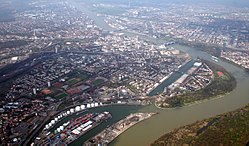Ludwigshafen-Oppau
| Ludwigshafen am Rhein | ||
|---|---|---|

View over Ludwigshafen
|
||
|
||
| Coordinates: 49°28′52″N 8°26′07″E / 49.48111°N 8.43528°ECoordinates: 49°28′52″N 8°26′07″E / 49.48111°N 8.43528°E | ||
| Country | Germany | |
| State | Rhineland-Palatinate | |
| District | Urban district | |
| Government | ||
| • Lord Mayor | Eva Lohse (CDU) | |
| Area | ||
| • Total | 77.68 km2 (29.99 sq mi) | |
| Population (2015-12-31) | ||
| • Total | 164,718 | |
| • Density | 2,100/km2 (5,500/sq mi) | |
| Time zone | CET/CEST (UTC+1/+2) | |
| Postal codes | 67059 - 67071 | |
| Dialling codes | 0621, 06237 | |
| Vehicle registration | LU | |
| Website | www.ludwigshafen.de | |
| Largest groups of foreign residents | |
| Nationality | Population (2011) |
|---|---|
|
|
9,832 |
|
|
5,673 |
|
|
1,928 |
|
|
1,806 |
|
|
1,792 |
|
|
1,165 |
|
|
1,094 |
Ludwigshafen am Rhein (German pronunciation: [ˈluːtvɪçsˌhafn̩ am ʁaɪ̯n]) is a city in Rhineland-Palatinate, Germany. It is located on the Rhine river opposite Mannheim. With Mannheim, Heidelberg and the surrounding region, it forms the Rhine Neckar Area.
Known primarily as an industrial city, Ludwigshafen is the home of chemical giant BASF, as well as other companies. Among its cultural facilities are the Staatsphilharmonie Rheinland-Pfalz. It is the birthplace of the former German chancellor Helmut Kohl and the philosopher Ernst Bloch.
The city is a global city with Sufficiency status.
In antiquity, Celtic and Germanic tribes settled in the Rhine Neckar area. During the 1st century B.C. the Romans conquered the region, and a Roman auxiliary fort was constructed near the present suburb of Rheingönheim.
The Middle Ages saw the foundation of some of Ludwigshafen's future suburbs, including Oggersheim, Maudach, Oppau and Mundenheim; most of the area, however, remained swampland, its development hindered by seasonal flood of the Rhine river.
...
Wikipedia


